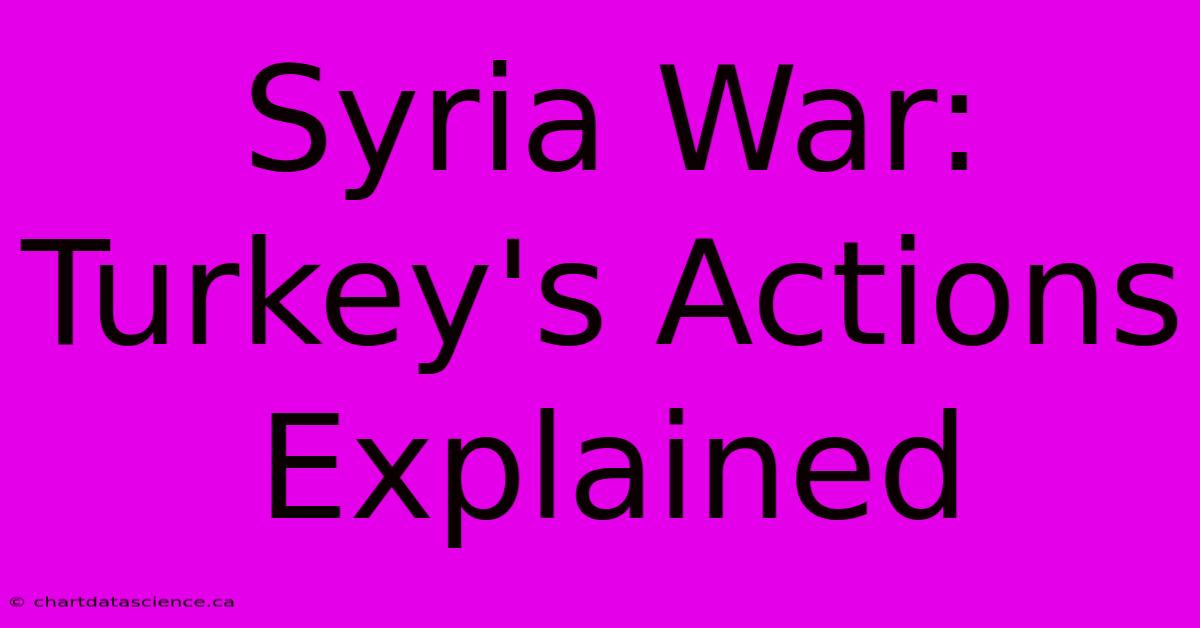Syria War: Turkey's Actions Explained

Discover more detailed and exciting information on our website. Click the link below to start your adventure: Visit My Website. Don't miss out!
Table of Contents
Syria War: Understanding Turkey's Actions
The Syrian Civil War, a brutal conflict that began in 2011, has seen the involvement of numerous international actors. Turkey's role, however, has been particularly complex and multifaceted, often drawing criticism and sparking debate. Understanding Turkey's actions requires considering its historical context, strategic goals, and domestic political landscape.
Turkey's Historical Ties and Security Concerns
Turkey shares a 911-kilometer border with Syria, making the conflict a significant security concern. For centuries, the region has been a focal point of Turkish influence, and the instability in Syria directly threatens Turkish national security. Turkey's primary concerns include:
-
Kurdistan Workers' Party (PKK): The PKK, designated a terrorist organization by Turkey, the US, and the EU, has operated in northern Syria for decades, utilizing the region as a base for attacks within Turkey. This presents a direct threat to Turkish territorial integrity and national security. Turkey's military incursions into Syria are often justified as efforts to curb PKK activity and prevent the establishment of a Kurdish autonomous region along its border.
-
Refugee Crisis: Syria's civil war has generated a massive refugee crisis, with millions fleeing the violence. Turkey has absorbed a large number of Syrian refugees, placing a significant strain on its resources and infrastructure. This humanitarian burden has become a key driver of Turkish foreign policy in Syria, influencing its actions and negotiations.
-
Regional Influence: Turkey aims to maintain regional influence and protect its interests in the broader Middle East. The Syrian conflict has created a power vacuum, and Turkey actively seeks to shape the outcome to prevent the rise of unfriendly actors and strengthen its position in the region.
Turkey's Military Interventions and Objectives
Turkey has undertaken several military operations in Syria, each with different objectives and justifications. These include:
Operation Euphrates Shield (2016-2017):
This operation aimed to clear ISIS from the border region and prevent the establishment of a contiguous Kurdish-controlled territory.
Operation Olive Branch (2018):
This operation targeted the People's Protection Units (YPG), the Syrian Kurdish militia considered by Turkey to be a Syrian branch of the PKK. The goal was to secure the border region and prevent the formation of a Kurdish statelet.
Operation Peace Spring (2019):
This operation, again targeting the YPG, aimed to establish a "safe zone" along the border to resettle Syrian refugees and to prevent the growth of Kurdish influence.
Subsequent operations:
Smaller-scale operations have continued following the above, often focused on counter-terrorism efforts and addressing perceived threats to Turkish security.
Domestic Political Implications
Turkey's actions in Syria are also significantly shaped by its domestic political landscape. The government's handling of the Syrian crisis is a key factor in shaping public opinion and influencing electoral outcomes. This creates an environment where decisive action, even if controversial, is often politically advantageous.
Criticisms of Turkey's Actions
Turkey's involvement in Syria has attracted considerable criticism. Accusations include:
-
Human rights abuses: Reports of civilian casualties and human rights violations during Turkish military operations have fueled international condemnation.
-
Destabilization: Some argue that Turkey's interventions have further destabilized the region, exacerbating the conflict and hindering peace efforts.
-
Support for rebel groups: Turkey's support for various Syrian rebel groups has also been controversial, with concerns raised about the ideologies and practices of some of these factions.
Conclusion: A Complex and Evolving Situation
Turkey's role in the Syrian War is complex, driven by a combination of security concerns, humanitarian pressures, regional ambitions, and domestic political factors. While its actions aim to safeguard Turkish national interests, they are often criticized for their human rights implications and potential for further destabilizing the region. Understanding this complex interplay is essential to comprehending the ongoing conflict and its wider regional impact. The situation remains fluid, and the long-term consequences of Turkey's involvement in Syria are yet to be fully determined.

Thank you for visiting our website wich cover about Syria War: Turkey's Actions Explained. We hope the information provided has been useful to you. Feel free to contact us if you have any questions or need further assistance. See you next time and dont miss to bookmark.
Also read the following articles
| Article Title | Date |
|---|---|
| Epl Match Crystal Palace Vs Manchester City | Dec 07, 2024 |
| Derby Merseyside Sejarah Di Goodison Park | Dec 07, 2024 |
| Us Ban On Tik Tok Remains | Dec 07, 2024 |
| Polytechnique 35 Years Unforgotten Victims | Dec 07, 2024 |
| Warriors Defeat Rockets Amid Shooting Woes | Dec 07, 2024 |
